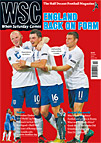 In an era of phone-hacking, are footballers treated unfairly by the tabloids?
In an era of phone-hacking, are footballers treated unfairly by the tabloids?
If all the allegations about extra-marital affairs among the current England squad were to be printed, the tabloids would have enough material for a daily supplement each. No matter how many times players are caught up in such stories, there are always more on the way. The saga of Wayne Rooney’s three-month affair in the summer of 2009 was plastered across the press for several days at the start of September, while injunctions are currently preventing the publication of stories about three other players
At the time of writing, “Roo’s vice shame” seems to be following the traditional pattern. The girl involved describes what they got up to, while expressing her amazement that the married player was prepared to continue with the affair. The newspaper involved says that the player’s partner is “devastated” while family and friends express their shock and anger at what has taken place. It is assumed that the player’s form will be affected by the revelations and that he will need counselling from his worldly-wise manager. The next step is for the player to express his contrition in public, in an exclusive with the paper that broke the story. His partner – having been seen in public in dark glasses with head bowed – decides to forgive him, after which she is hailed for her bravery by half the press while the rest deride her for being a doormat. The following month it’s someone else’s turn.
The problem with football’s assorted loverats is that they are always so meekly obedient once this type of story has been published. Just once let’s see a footballer come out and say that he has extra-marital affairs because he enjoys them, that they’re very easy to indulge in for someone who is away from his family for days at a time, even a perk of the job. He’d be dismissed as a crass fool for saying it but that’s how he’ll be seen anyway. Instead, he and his partner allow themselves to be the subject of a sickly morality play.
Faced with an unrepentant player and, even better, a partner not prepared to play along with the role of deceived victim, the press would no longer be able to flex their power as judge and jury. As it is, moral principles are applied in a highly inconsistent manner – it all depends on how the tabloids’ target is perceived by the public. A former England international, now retired, managed to keep stories about his extra-marital affairs out of the press for over a decade. He was able to escape through a combination of legal threats and the fact that he had a positive public image – an attack on him might have rebounded on his pursuers.
Similarly, the News of the World couldn’t have run the Rooney story or anything similar on an international team-mate before or during the World Cup in case it was adjudged to have affected the team’s performances. John Terry’s affair a few months beforehand got the full treatment because it involved the England captain, a role that is given absurd prominence in our football culture. If you’re part of a winning team you can do what you like.
Indeed such an outlook seems to have shaped the public behaviour of many of our best-known players for a long while. Had Rooney played a starring role in a team that had won the World Cup or even gone out “bravely” on penalties in the latter stages, we would never have heard about a year-old affair. Now, however, there is assumed to be a public appetite for negative stories about players who were roundly derided as arrogant overpaid wastrels after England’s poor performances in South Africa.
John Terry’s wife was so upset by the almost forensically detailed revelations of her husband’s infidelity that she fled to Dubai, as you do, to gather her thoughts – after which she decided to stick with him. Coleen Rooney is said to have a personal fortune of around £8 million, which includes various advertising contracts, magazine columns and her own TV show. She might have accumulated all that by her own efforts within seven years of completing her GCSEs (she got 11) but being married to England’s most famous footballer will certainly have helped. All the other stuff must seem like an occupational hazard.
Meanwhile, if the News of the World are looking for a real scandal to get their teeth into, they should investigate claims that the prime minister’s communications director authorised phone tapping of various prominent figures when he was editor of… ah. Footballers have their uses.
From WSC 284 October 2010